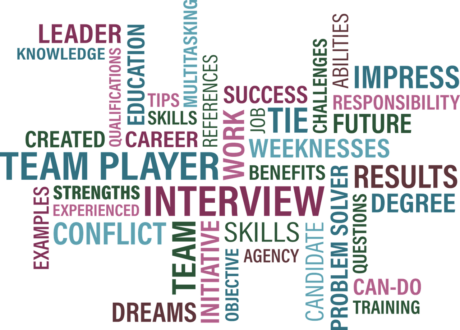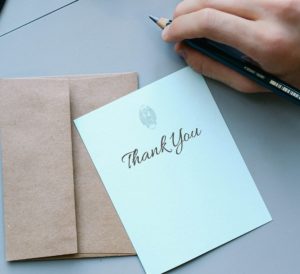
Three Tips for Each Side of the Table
As candidates, for some reason, we think getting our foot in the door is the biggest hurdle, so we spend weeks perfecting our resume, Linkedin profile and cover letter. And then when it comes to the interview, we wing it.

This is not a good idea.
As companies, the story is pretty darn similar. We tend to narrow down people based on resume keywords, hard skills and experience. It’s all very linear and numbers-based. Then we arrive at the interview relying solely on our gut.
Also a bad idea.
I always look for a few critical team member virtues, but the interview process deserves more attention. These interviewing tips are not profound. Yet they work–and remarkably well.
For the Candidate: Ask Questions, Dress Up and Use a Stamp
1. Questions: You know it’s coming. At the end of the interview, they ask. . . . “Did you have any questions?” Have at least five ready to go. Ask about the team, your boss, how your success will be measured, what kind of software they use, their meeting philosophy, the vacation policy, anything. If you need time to organize your thoughts, take it. Silence is okay. And if you don’t get the role, but feel like it was a close call, email the hiring manager to ask for feedback. New hires fall through all the time. And you want to be kept in mind.
2. Dress Code: At some point in the last 20 years, candidates started mirroring the interviewer. If interviewing on Friday, they dressed down. And in construction, this philosophy would mean every candidate would be casual–maybe even grubby. You may think you want to match the culture, but more important than that is to show respect for the hiring process and honor the people you’re meeting with. Wear a suit.

3. Snail Mail Thank You Cards: Nobody will expect this, which makes it all the more effective. Rather than a standard one from a pack of 12, head to the store and choose one that aligns with the company mission, a conversation you shared or your own personal aspirations.
Use a return address sticker, maybe even a fancy stamp. Draft your message on the computer before beginning to write.
**Bonus: Remember that how you treat the receptionist, an employee’s kids, the VP’s dog and the janitor all contribute to your impression.
For the Company: Dig Deep, Prepare and Follow Up

1. Get Specific: Hard skills are already a known quantity at this point. The interview goal is to find insight on them as human beings, so use a journalistic lens to go deep. Try these questions: What’s your favorite fiction book? Tell me about a time when you felt successful. How do you get involved in community organizations? What role do you like to play in a meeting?
2. Prepare: Study not just their resume, but their online presence. Provide an agenda for the candidate if its multiple hours long. Discuss goals with fellow interviewers. Determine everyone’s biggest priority, any deal-breakers and who’s going to ask which questions. This will not only inform candidate decisions, but help you present better as a company.
3. Follow Up: Hiring managers often don’t bother to follow up with candidates who didn’t get the job. But especially if you were impressed, however, they didn’t quite make the cut, it’s important to maintain those relationships. Next time you need a candidate (next week or next year) you can start with them instead of ground zero.
**Bonus: Remember that how you talk on the phone, to the receptionist and to your colleagues all contribute to your impression.
Interviewing A Group?

Create a script and rehearse. Choose a leader. Dress at the same level. If a computer is necessary, choose just one person to take notes. Ensure you have the same agenda, you’ve distributed questions evenly and that everyone participates.
Interviewing As a Group?
Bring only people who will be talking. Assign people certain topics. Have employees who don’t usually interview practice making eye contact and encourage them to be honest (i.e., “This interviewing stuff isn’t really my thing, but I’m excited about the project because I love working on hospitals.”)
Interviewing is really just a conversation, right? Authenticity and preparation are valued. Follow these basic steps and you’ll do just fine on either side of the table.

